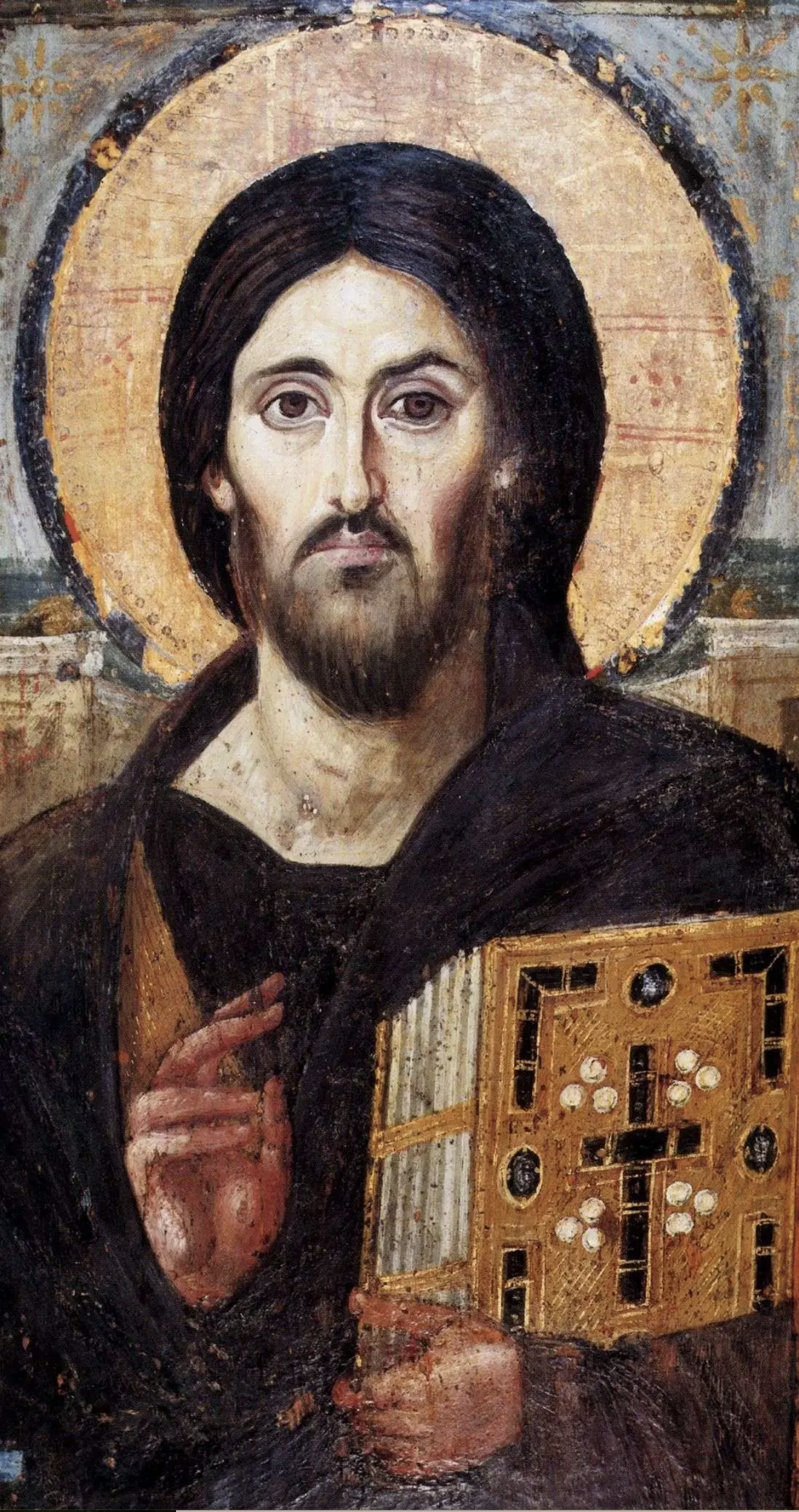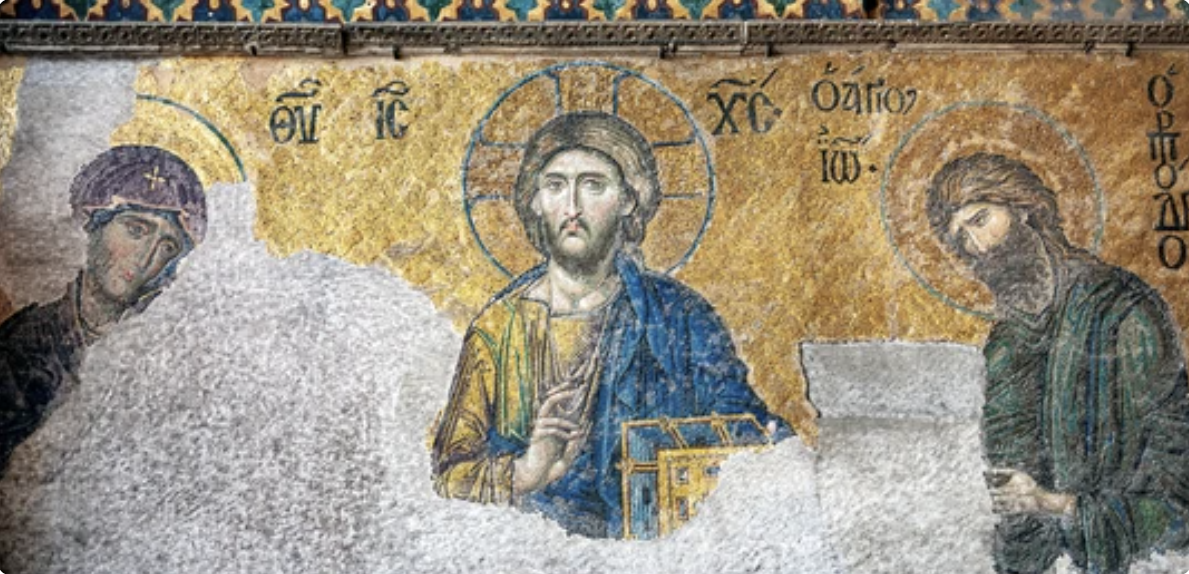
He is the Creator-God, the Great Emperor, the Law-giver, our Judge and Court of Last Appeal. He is the Beginning and the End.


He is
the Creator-God,
the Great Emperor,
the Law-giver,
our Judge and Court of Last Appeal.
He is
the Beginning and the End.
Among the earliest icons of Jesus is as the Pantocrator, the Ruler of All. This mid-sixth-century icon from Saint Catherine's Monastery, Sinai, depicts a Regal Figure Who, on His right, bestows mercy, and, on His left, holds the Book of Life, and scrutinizes in judgment. Both are present, for He is the King — in Him alone resides blessing, and He alones renders judgment which is final.
He is addressed or referred to as Kúrios 653 times in the New Testament, meaning King, Lord — the same word that is used in the LXX to refer to YHWH. And, of course, this does not take into account the many times His Kingdom is mentioned.
To appear in our midst, to empty Himself of His Empyreal glory, to put on human clothes of flesh and blood, is an act of condescension too great to comprehend with our impoverished organs of perception.
We must not in our zeal or ignorance rush forward to embrace Him as our familiar or in any way approach Him without due reverence. He is not our chum, our fellow, our pal. His is a Dignity far above any we shall ever behold on earth. Encountering Him, our first emotion must undoubtedly be awe.
Yet, we often do not see Jesus in His aspect of Kingly Dignity. Twentieth-century American Christianity has taught us not to expect it .... but quite the opposite. We want the meek and mild Jesus, not the royal mien of an Emperor. So we read past these details in the Gospels. We order the words and facts to what we already think is true. To coin a phrase, "We can only find what we are already looking for."
We prefer the Jesus-we-imagine to the King-Who-really-is. Our ego and stubborn pride prevent us from seeing the truth. But as recently as the nineteenth-century, Christians in the West did not fail to bow before the King of Kings. Even the most tender and familiar hymns do not forget to render Him veneration:
| "Fairest Lord Jesus, Ruler of all nature ...." |
and
| "The King of love my Shepherd is ...." |
| "All creatures of our God and King ...." |
We (in the twenty-first century) do not see the impassive Emperor, Who in His perfect serenity inhabits stillness and issues commands.
| So Jesus stood still and commanded him to be brought to Him. (Lu 18:40) |
When the blind man is brought into His Presence, Jesus does not minister to him, does not hold his hand, does not speak consoling words. He does not even touch him.
For an Emperor is austere, speaking few words. Our English translations do not capture the mood. They are too wordy compared to Greek.
What boon would this man have, Jesus asks.
The man replies in three words:
| Κύριε, ὶνα άναβλέψω. / Kúrie, ìna ánabléψo. (Lu 18:14) |
He devotes the first word of the three to veneration (and we imagine he kneels): Kúrie, "O King," he says. The boon he asks, we imagine he has longed for all his life, yet he voices only two words. More than two, he dare not venture lest he weary the Emperor. Beyond this, we hear only prayers of thanksgiving.
We know that the whole crowd held Jesus in veneration. As He passed they maintained silence. They were appalled that this man should speak: "O Son of David ...." (By the way, a very high form of address.) But the shushed him. They were silent in the Presence of the King.
The manner of healing is magnificent:
|
Then Jesus said to Him, "Receive your sight ...."
And immediately he received his sight ..... (Lu 18:41-43) |
It recalls the Creation of the universe in its majestic economy:
| Then God said, "Let there be light; and there was light." (Gen 1:3-4) |
All else is silence save "God saw the light, that it was good." Similarly, Jesus comments on the goodness of this little creation: "Your faith has made you well."
What awesome power is this, surpassing by far any earthly emperor with his tens of thousands of men at arms! Jesus tells Pilate He has 60,000 angels at His command (that is, is 60,000 super-men), yet He withholds. For that is not the power He wishes to reveal. Restraint. Few words only.
The Most Holy Theotokos understands this though God has touched her most intimately:
|
He hath shown the strength of His arm ....
He hath scattered the proud in their conceit .... He hath put down the mighty from their seat .... And the rich He hath sent empty away .... (Lu 1:51-53) |
Our God from the breath of His mouth created a world that is the sublime: unspeakable, gentle beauty, but also the roaring thunder, the flashing lightning, the boiling seas, the churning volcanoes:
|
Then He said, "Go out, and stand on the mountain before the Lord."
And behold, the Lord passed by, and a great and strong wind tore into the mountains and broke the rocks in pieces before the Lord, but the Lord was not in the wind; and after the wind an earthquake, but the Lord was not in the earthquake; and after the earthquake a fire, but the Lord was not in the fire; and after the fire a still small voice. (1King 19:11-12) |
The words of the Emperor are few. Nor does He plead His cause, which Pilate, the Sanhedrin, Caiphas, and all beheld during the Passion of the Christ. His signature statement and demeanor is silence.
As the faithful centurion tells Jesus, he speaks, and it is done. He does not fully appreciate Whom he addresses, Who set the stars in their courses and ordered a world, at His Word.
We dare not address Him carelessly. Yes, He is patient. Yes, He is merciful. Yes, He is humble .... in His way. He is even our Eldest Brother, the First-born of Creation (Colossians 1:15). But He is not our peer.
Can you cite one passage in Scripture that depicts Jesus as being our equal? We say that Jesus is famously mild, but not a single passage describes Him this way. Is this not an invention of the present age, in which nine-year-old boys address grave men by their first names?
We say that Jesus is meek, yet we will not find that word in the New Testament .... but quite the opposite:
|
But sanctify the Lord God in your hearts,
and always be ready to give a defense to everyone who asks you a reason for the hope that is in you, with meekness and fear; (1 Peter 3:15) |
It is we who must be meek .... when even speaking about God or godliness.
Oh yes, there is the lone passage in St. Matthew's Gospel. How oft it is quoted in collections of prayers because it is the only one:
| I am gentle and lowly in heart. (Mt 11:29) |
But read this passage more carefully. He is instructing us here to put on a lifelong yoke, to submit And it turns out that this yoke is the instrument our own crucifixion.
The holy calling to become His disciple, responding to His divine command, is a call to humility, not familiarity. He orders us to take up our crosses. We are to crucify our proud egos, our presumptions, our desire to arrogate to something higher (Mt 20:21). When in fact we are called to humble silence. St. Seraphim of Sarov warns that
| Silence is the cross on which we must crucify our ego. |
Take care what you say, for this great saint advises we say nothing.
He is our God and our King. We are His creatures, the ones He created. So far above and beyond is He from us that while we have being (without which there is nothing), He Alone Is Being. "I AM" is His Name. And before that Name every knee must bow (Phil 2:10), every soul must quake, and every tongue must render Him silence .... as the blind man was instructed on the road.
Silence is the sound He loves best, where He meets with us, where we clear a space for angels and even the Divine Presence:
| When He opened the seventh seal, there was silence in Heaven about the space of a half hour. (Rev 8:1) |
No. He is not our chum. He is not our familiar.
| And He hath on His vesture .... a Name written, King Of Kings, And Lord Of Lords. (Rev 19:16) |